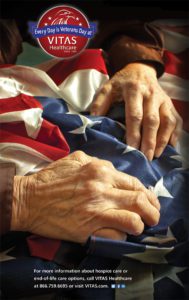By Robert Johnson, general manager for VITAS® Healthcare


Physical, Emotional and Psychological Pain
The harsh toll of war includes diseases, disabilities and illnesses that can complicate end-of-life care. Even if a veteran successfully overcomes military trauma, symptoms of depression and post-traumatic stress disorder (PTSD) can arise at the end of life, especially if prompted by an emotional or traumatic experience—like receiving a terminal diagnosis.
In addition to physical and psychological conditions, emotional concerns may surface, such as feeling the need to purge themselves of memories by discussing their military experience with others—sometimes for the first time.
Navigating Veteran Needs
At VITAS Healthcare, the nation’s leading provider of end-of-life care, we have extensive experience with veterans. Our goal is to make sure our veteran patients feel safe and secure. Every VITAS program has hospice team members trained to address the needs of veterans and their families. This includes VITAS clinical staff, as well as skilled social workers and chaplains who help and counsel patients and their families. VITAS’ veteran volunteers also play a valuable role by listening, understanding and empathizing in ways even family members sometimes cannot.
Honoring Veterans at the End of Life
Giving veterans the recognition they deserve can make a world of difference. At VITAS, we offer each veteran a recognition ceremony honoring their military service. Sometimes it happens quietly, right at
the bedside. Other times it’s an event with the entire community in attendance.
VITAS staff help identify potential entitlements and coordinate with the VA, service members’ agencies, and other local and state organizations to help veterans and families acquire the benefits they have earned.
At VITAS, it is our task and our honor to make sure veteran patients and their families know they are never alone. From challenging clinical symptoms to complicated benefits issues to a simple “thank you,” veterans should feel supported. It is never more important than at the end of life to show veterans unwavering honor and respect.
 Southwest Florida's Health and Wellness Magazine Health and Wellness Articles
Southwest Florida's Health and Wellness Magazine Health and Wellness Articles
